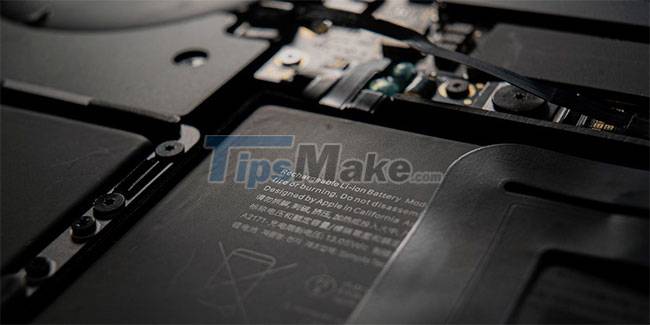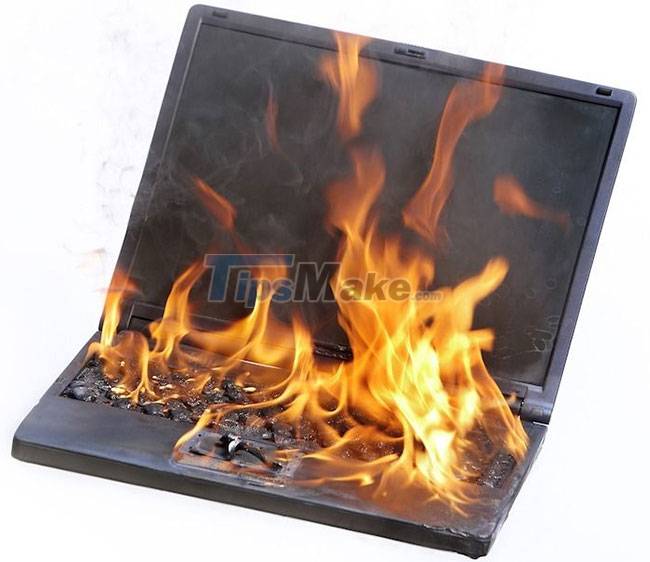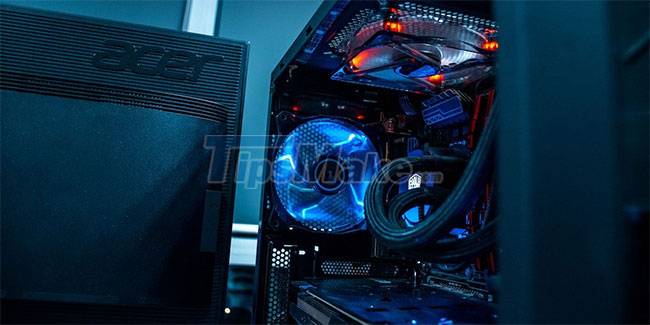5 reasons not to buy a gaming laptop
Depending on your situation, these can range from inconvenience to prices beyond your ability to pay. If you are considering a gaming laptop, here are 5 downsides to keep in mind.
1. Gaming laptops don't have the best battery life

While the duration will vary from model to model, the battery life of most gaming laptops is a bit short.
Gaming laptops require powerful and demanding components, namely CPU and GPU, to run the game as best as possible. However, the more powerful a component, the more power it requires, so the shorter the battery life of a gaming laptop.
An important problem with this is that manufacturers have not upgraded gaming laptop batteries to the same level as CPU and GPU components. Most gaming laptops struggle to last more than 4 to 5 hours, when unplugged, and less so during an intense gaming session.
When compared to non-gaming laptops, gaming laptops are far below the norm. A major reason for this is that most non-gaming laptops can be more energy efficient because of the lack of demanding components that gaming laptops possess.
If you're comparing the average gaming laptop life to the 17-20 hour battery life of Apple's M1-equipped compact MacBook Pro, the difference is stark.
This means, if you have a gaming laptop, no matter where you are, you'll probably want to plug it in while you play.
2. Gaming laptops lack upgrade options

There are many brands that offer gaming laptops, with many different models and specifications. One thing in common, however, is the lack of upgrade options, especially when compared to gaming PCs.
If you're a console gamer, you'll find some additional upgradeable areas if you switch to a gaming laptop, such as being able to upgrade the RAM and being a bit more comfortable in the game. Hard drive upgrade. If you're a desktop PC gamer, the upgrade isn't too much.
Key components at risk of failure in a gaming laptop - CPU and GPU - are not upgradable. The same applies to other key components, such as the laptop battery and the internal cooling system.
It's all about how manufacturers mount these components, their size, and their power consumption. Unlike PCs, these are not replaceable parts. You can't just delete them and then attach the latest version of said component.
While there are ways to improve performance on a gaming laptop, the only way you can upgrade your machine when it's outdated is by buying a new device.
3. Hot and noisy gaming laptop

One prominent drawback of gaming laptops is the heat and noise they generate when subjected to intense activity.
While the internal cooling of gaming laptops is improving and the builds allow for improved airflow, you will still get a lot of heat and fan noise due to the work of gaming laptops. at full power to prevent overheating during intense gaming.
This is a big problem for thin gaming laptops, gaming laptops with poor structural design and also gaming laptops with powerful components.
With thinner gaming laptops, you're cramming components into a smaller space, which of course generates more heat. You cannot add a large internal cooling system because that will not guarantee the thin nature of the laptop.
The poor build designs on gaming laptops speak for themselves. There are several examples of poor design, such as the use of cheap materials, placement of vents, or poorly arranged and positioned components. This results in poor ventilation, which will do nothing to help cool or quiet your gaming laptop.
With the top gaming laptops, the problem lies in their components. Powerful components need a lot of power, which generates a lot of heat. Unless your gaming laptop has a complex cooling system, this will lead to overheating during gaming or intense activity.
While it's common practice to invest in a heatsink, along with never placing your laptop on soft surfaces - including on your lap - these will only alleviate the problem, not eliminate it. .
Right now, with gaming laptops, high temperatures and noise are a common association. So if you buy a gaming laptop, make sure you don't use it in a quiet public space.
4. For console gamers, gaming laptops are a lot more expensive

If you are a console gamer looking for a gaming laptop, the first thing that might catch your eye is their price.
A mid-range gaming laptop will cost you at least more than 20 million VND, double the price of about 10 million VND for leading products of Sony and Microsoft. And, if you are looking for a gaming laptop with approximate specs of PS5 or Xbox Series X, then the amount to spend will be about 25 million.
One potential argument is that, as improved laptops come out year after year, you just need to wait a few years to buy a gaming laptop that's better than current generation consoles. Or wait for a PS5 or Xbox Series X equivalent gaming laptop to drop in price.
However, there are two problems.
First, with newer gaming laptops, you still have to pay more than 20 million VND for a suitable model. Plus, you never know if next year's newer devices could be a huge step up from your laptop.
We've seen this happen this year, as the latest gaming laptops are about to get a complete overhaul of both the CPU and GPU, but still at the same price point as last year.
Second, it's going to be a long time before you find a brand new gaming laptop with console-level specs for around VND10 million. While the prices of existing gaming laptops will drop as new laptops come out, prices aren't falling as quickly as you might think.
While perhaps a gaming laptop is much more versatile than a console, it's still an option worth considering, considering that you'll have to spend more than twice the money to get a gaming laptop with The specifications are almost the same.
5. For gaming PC gamers: Building and upgrading gaming PCs will save more money

If you're thinking of switching from desktop PC gaming to a gaming laptop, know that, despite the added convenience, there are also inherent limitations.
Additionally, your desktop version will be upgradeable, allowing you to replace old components instead of buying a whole new device every time you need it.
The hardware in gaming laptops is also a tweaked version of the kind found in desktop hardware, to allow for their more portable and compact nature. These laptop-oriented components are less powerful than PC components and are therefore less likely to be suitable for future use.
With fewer upgrade options and a shorter lifespan, it still costs less to build your own gaming PC than to buy a gaming laptop.
Gaming laptops have some major hurdles worth considering if you're thinking of making the move to mobile gaming.
However, that's not necessarily bad news. Gaming laptops are improving, with their manufacturers trying to find more effective solutions to their shortcomings. While nothing is certain yet, the potential that gaming laptops have for the future is exciting.